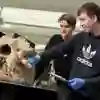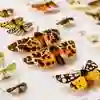




Zoology is all about animals, whether you just want to understand them better or work to protect the amazing biodiversity of our planet.
This can’t just be done in a classroom so this course focuses on a blend of laboratory and field-based practical teaching, as we recognise the need to work across disciplinary boundaries to solve global issues. Our academics include three winners of the Royal Society of Biology’s Higher Education Bioscience Teacher of the Year Award. No other university can claim that.
You can also opt to take a year abroad, studying overseas at one of our partner universities. Gain new skills, build international contacts, and immerse yourself in a different culture and environment.
About this course
Explore all aspects of animal life, from subcellular level to ecosystems, in a course designed for 21st-century scientists.
You’ll control the emphasis of your studies with opportunities to focus on species that interest you across a range of contexts including conservation, ecology, behaviour, evolution, environmental management, physiology, cell biology and genetics – allowing you to build a course to suit your passions and ambitions.
Our teaching takes place in a friendly, supportive environment – and is led by award-winning academics – but our degree is also career-focused with lots of opportunities to learn in the field so that you develop the practical experience to complement your theoretical knowledge.
Recent overseas trips have included Mallorca, Malaysia and Brazil, and you’ll also be spending time on residential field trips in the UK. There's also the option to spend a year studying abroad at one of our partner universities to gain new skills, build international contacts, and immerse yourself in a different culture and environment.
Plus, our programme is built around skills requested by bioscience employers, including genomic technologies, field survey techniques, GIS, and science communication skills. You can even become a PADI-certified Advanced Open Water Diver as part of your degree, putting you one step ahead of the competition when you graduate.1
Start a field trip that never ends
Module options
Each year, you’ll study modules worth a certain number of credits, and you need 120 credits per year. Most modules are 20 credits – so you’ll study six modules each year. Some longer modules, such as a dissertation, are worth more. In these cases, you’ll study fewer modules - but the number of credits will always add up to 120. Some modules are compulsory, some are optional, so you can build a course that’s right for you.
Filters
Cells and Organelles
Explore the fascinating inner workings of cells, giving you a foundation in areas such as cell biology, molecular biology and biochemistry.
compulsory
20 credits
Diversity of Life
Through practical workshops, this module introduces you to the diversity of life and the fascinating adaptations that enable organisms to inhabit nearly all conceivable ecological niches.
compulsory
20 credits
Marine Biology: An Introduction
From space, the planet is blue. Marine life has evolved into a myriad of forms living in some of the most extreme habitats on the planet; from great depths to battered coasts. This introduction to marine biology explores the marine environment, the diversity of life within it and how to conserve it.
compulsory
20 credits
Evolution
Why did sex evolve? Why do we die? What is a species? How can evolutionary medicine help us? This module will provide you with an understanding of how life on earth came to be what it is, from genes to species. Without evolution, nothing in biology makes sense.
compulsory
20 credits
Ecology (with optional Dive Training)
Ecology is the study of interactions among living organisms and their environment, and is the basis for nature conservation and understanding human impact on the planet. Gain an understanding of ecological theory, applied ecology, and the collection and analysis of ecological data. You can choose to complete integrated PADI Advanced Open Water training, with an opportunity to develop specialist diving skills relevant to ecological science.
compulsory
20 credits
Molecular Biology and Genetics
DNA holds the secrets to life itself. Find out how key information is stored within the genes and the processes by which cells decode and interpret this genetic information to bring about essential cellular functions. You will discover how genetic information is inherited and what happens when things go wrong. Explore how molecular biology and genetic manipulation techniques allow us to uncover why genetic changes can lead to human disease and can potentially offer opportunities to diagnose and even treat them.
optional
20 credits
Environmental Problems and Solutions
Discover the fundamental principles of environmental systems and the interconnectedness of humankind with the environment.
optional
20 credits
Vertebrate Zoology
This module provides an integrated view of vertebrate biology by showing how changes over time and geography drive morphology, physiology, behaviour, and ecology in different vertebrates. Structure-function relationships are presented to appreciate how different animals evolve similar solutions and adaptations to the same ecological challenge while closely-related animals diversify in response to different environmental challenges.
compulsory
20 credits
Animal Behaviour
We're looking forward to exploring key concepts in Animal Behaviour with you. We will be using an evolutionary approach to understanding animal behaviour. During the course, we will offer you the opportunity to develop your observation skills and apply them to answer questions around animal behaviour using a scientific approach.
Whether you are interested in conservation, ecology, animal welfare or animal husbandry, this module will provide you with a solid base for understanding many disciplines in a range of careers. Overall, we hope you find this module interesting and fun.
compulsory
20 credits
Our facilities



Watchlist
Dr Dom Henri
Course overview
2 mins
Zoology Close-Up
Course Highlight
3 mins
The Gold Standard for Teaching
University life
1 min
Featured academics
We have three Higher Education Bioscience Teacher of the Year winners in our department and a reputation for world-leading research.5
This makes for a wide choice of final year projects, with particular specialisms in the evolution of behaviour and the monitoring, management and conservation of wildlife.

Professor Robert Knell
Professor of Zoology
Rob is a Professor of Zoology and an active researcher with interests in a variety of different aspects of ecology and evolution, mainly to do with either parasites, immune systems, sex or all three.

Dr Jen Bright
Lecturer in Zoology
With a background in palaeontology and geology, Jen became interested in Biological Science because it's "easier to study living dinosaurs (birds) than it is to study extinct ones". Jen is now a lecturer in Zoology able to draw on those experiences.
Entry Requirements
What do I need?
This course is currently available through Clearing, which means our entry requirements are a bit different to what they would normally be.
At Hull, you're a name not a number. During Clearing, we look at all of your qualifications and experience, not just your academic grades. We may be able to offer you a place whatever your situation. Get started by completing our eligibility checker, and find out immediately if you could study at the University of Hull.
Have questions? Our admissions team will be happy to help.
Fees & Funding
How much is it?

Future prospects
Our graduates go on to a wide-range of careers including professional biologists, laboratory officers, environmental consultants and microbiologists working for employers such as Reckitt, the Environment Agency, Natural England, wildlife trusts and conservation agencies.
Many of our students also go into postgraduate study, including enrolling onto a range of our taught Masters programmes, research Masters programmes, or even PhDs.
Learn more about BSc Zoology
Become part of the next generation of futuremakers
Like what you’ve seen? Then it’s time to apply.
The standard way to apply is through UCAS. This will give you the chance to showcase your skills, qualities and passion for the subject, as well as providing us with your academic qualifications.
Not ready to apply yet?
Visit our next Open Day, and see all that the University of Hull has to offer. Talk to our lecturers about your subject, find out what university is really like from our current students, and take a tour of our beautiful campus and amazing facilities.
You may also be interested in...
Module options include PADI-certified Advanced Open Water Diver training (extra fee may be payable).
Most overseas trips run in the summer between the second and third year. There is an extra charge but the trips are subsidised. Destinations listed are currently included in our list of field trip opportunities but may be subject to change.
Zoology is ranked 7th in the UK for Satisfied with Teaching. The Guardian University Rankings 2026.
Zoology is ranked 10th in the UK for Teaching on my course. National Student Survey (NSS) 2025, HEIs only
Royal Society of Biology’s 'Higher Education Bioscience Teacher of the Year Award
94% employability (Geography and Environment) UK domicile full-time first degree leavers; Higher Education Graduate Outcomes statistics, for the academic year 2022/23, published by the Higher Education Statistics Agency June 2025.
All modules on this course page are subject to availability and this list may change at any time.